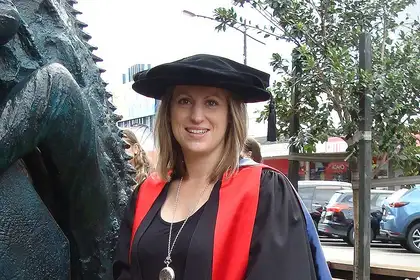
The incidence of human papillomavirus (HPV) positive oropharyngeal (throat) cancer has increased in many developed countries, including New Zealand. Here, rates have almost quadrupled between 1996 and 2012 but the role of HPV has remained uncertain.
Now, new research from Massey University PhD graduate Dr Rebecca Lucas-Roxburgh shines a light on HPV cancers in New Zealand, and the importance of vaccinations.
HPV is a very common sexually transmitted virus which will infect most people at some point in their lives, but the majority of infections are cleared by the body’s immune system. However, in some cases the virus can cause cells to grow abnormally and over time lead to cancer of the cervix, vulva, vagina, penis, anus, and oropharynx (throat). Since January 2017, HPV immunisation has been funded for everyone between the ages of nine and 26, including males.
Dr Lucas-Roxburgh’s research shows almost 90 per cent of throat cancer cases are now being attributed to HPV, up from 62 per cent in the 1990s. She says the study highlights how much of a problem HPV cancers are in New Zealand. “We have as many HPV positive oropharyngeal cancer cases now, as we do cervical cancers. With adequate uptake, vaccination is likely to have a considerable impact on the future incidence of HPV positive throat cancer in New Zealand.
“The strain of HPV, known as HPV 16, accounted for many of the cases we looked at,” she says. “During the study time frame, there were 621 cases. We ended up with 267 in our study, so it’s a good national data set. We expected about 90 per cent would be caused by HPV 16, but there were only two cases that weren’t. While this was unexpected, it’s great news. We recently updated the vaccine in New Zealand to one which covers more types, but even the one we used earlier had HPV 16 in it, so in terms of prevention, it was a good surprise,” Dr Lucas-Roxburgh says.
“Like any research, this work has thrown up more questions which I would like to investigate. We understand oral sex is one of the major risk factors, but there are others that came up in this study that we need to look in too, such as industrial occupational exposures to hazardous substances.” Dr Lucas-Roxburgh says the current testing methods are the best available, “Going forward, it is possible different treatments will be used for HPV positive and negative cases. If this happens we need to better determine the tumours HPV status, so as not to under or over treat the patient.”
She says another big question still looms – can HPV cancers be screened for in the same way as cervical cancers? “It doesn’t look like it at this point, but tumour brushings like we used in this work, may be useful for getting the patient in front of a specialist sooner, but this is one of those areas for further investigation.”
Currently, Dr Lucas-Roxburgh is working at Medlab Central, performing cervical screening and molecular testing. She is also doing some casual work at Massey University.
“I would like to thank my supervisors, Associate Professor Laryssa Howe and Associate Professor Jackie Benschop from the School of Veterinary Science, and Dr Bruce Lockett from Medlab Central. Also, the labs and the patients involved in the study. I was often meeting with patients just after they had been told they had cancer, then I was asking to brush their tonsils, and ask lots of personal questions , so it was very selfless of them to agree to be involved.”
Dr Lucas-Roxburgh married her military husband in 2010, and the couple have a three and a half-year-old son Max. They are welcoming a second child in early September. She grew up in Marton, attending Rangitikei College. She now lives in Palmerston North. She holds previous qualifications, all from Massey, including a Masters of Medical Laboratory Science.